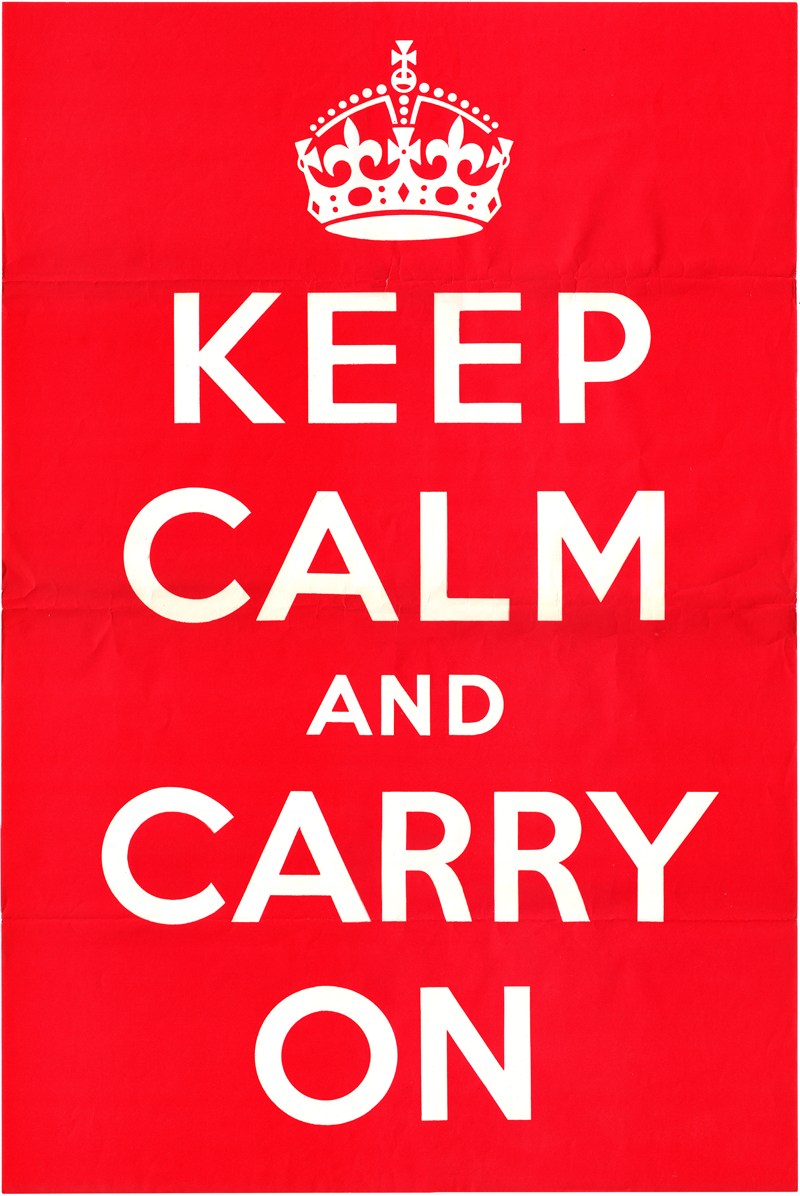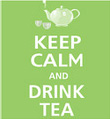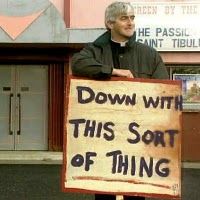| The danger of slogans | ||
 Slogans
are part of our everyday lives. They
enable an important point to be made in a few
words. In 2000, some bookshop owners found an
old government wartime poster asking the
citizens to Keep Calm and Carry On. They framed
it and hung it in their shop, but it created
such interest that they started having copes
printed. Now we have an entire industry
producing Slogans
are part of our everyday lives. They
enable an important point to be made in a few
words. In 2000, some bookshop owners found an
old government wartime poster asking the
citizens to Keep Calm and Carry On. They framed
it and hung it in their shop, but it created
such interest that they started having copes
printed. Now we have an entire industry
producing  reproductions
of the slogan on mugs, tea towels, deck chairs,
T-shirts and anything else which can be printed
on. There have also been numerous derivatives,
from ‘Keep Calm and Drink Tea’ to ‘Keep Calm and reproductions
of the slogan on mugs, tea towels, deck chairs,
T-shirts and anything else which can be printed
on. There have also been numerous derivatives,
from ‘Keep Calm and Drink Tea’ to ‘Keep Calm and
 Marry
Ron’. But the lack of words in a slogan can also
lead to a lack of clarity, rather like the
existing government slogan telling us to ‘Keep
Alert’. A slogan is a headline rather than
a fully argued statement. There is always a much
fuller message which the slogan is intended to
sum up. And so its success is judged by how well
it conveys the real message and at the same time
how memorable it is. Marry
Ron’. But the lack of words in a slogan can also
lead to a lack of clarity, rather like the
existing government slogan telling us to ‘Keep
Alert’. A slogan is a headline rather than
a fully argued statement. There is always a much
fuller message which the slogan is intended to
sum up. And so its success is judged by how well
it conveys the real message and at the same time
how memorable it is.Today, I saw a brief report online that a professor of English at Cambridge, Priyamvada Gopal, had been promoted to a full professorship only days after quite deliberately tweeting, for a second time: ‘White Lives Don’t matter’. She has been the subject of a torrent of hate speech as a result. I looked at other Google search results and they all said the same thing. It was only when I looked at the detail of the story itself, rather than the headlines, that I saw that the full tweet was actually ‘White lives don’t matter. As white lives’. So then what I had read was the original message truncated by the google search algorithm. Presumably it can only cope with one sentence from any quote. Which poses the question - why do we have such a liking for slogans when they can so easily be subverted? Would we not do better to exclude them from our speech in favour of saying what we actually mean, even if that took several sentences? But I suppose that that is to ignore millennia of slogans. One could argue that the Ten Commandments are slogans. They cover a variety of aspects of morality in a few words, so leaving quite a lot to be interpreted. ‘Thou shalt not kill’ is fine as a headline, but what about killing in self-defence or, as the Israelites were wont to do, smiting their enemies in order to conquer territory? God even stopped the sun its tracks at Joshua’s request so that the Israelites would have yet more smiting time during the day to slaughter their enemies. So then these religious slogans appear to allow of exceptions. More significant difficulties arise when the slogan is dealing with a controversial subject. It is only too easy for the underlying message to be ignored, usually deliberately ignored, by those of an opposing view. So then, what about ‘Black Lives Matter’? It’s a slogan which can very easily be misrepresented - and it is. If on the other hand the slogan was - ‘Black Lives Matter Just as Much as White Lives’, it would be quite difficult to argue with it, at least without being overtly racist. It wouldn’t be as catchy though. But it seems that we prefer to sacrifice clarity for catchiness. Which makes it very easy to say that ‘White Lives Matter’ or ‘All Lives Matter’ are just statements of truth. And they are, but when used as a reply to the Black Lives Matter slogan, then there is an implicit intention to deny, not the slogan itself, but the underlying message of the Black Lives Matter movement - that black lives have been disadvantaged for centuries and still are and so that it’s about time this was recognised and steps taken to address it. There are though also people who support the BLM movement who have gone further than they should, by making racist remarks about white people. The New York Times, has proudly parted company with people who could be thought of as criticising the BLM movement. However, it recently refused to part company with one of their editorial board members, Sarah Jeong - even though it was discovered she had previously posted a series of openly racist tweets such as: “White people have stopped breeding. You’ll all go extinct soon. That was my plan all along”; “Are white people genetically disposed to burn faster in the sun, thus logically being only fit to live underground like grovelling goblins” and “oh man it’s kind of sick how much joy I get out of being cruel to old white men.” Maybe she could use a good editor herself. Maybe there should be consistency of approach to racial prejudice in whichever direction it faces. Tension becomes greater, however, when what is a perfectly reasonable idea, that black lives do indeed matter, becomes a means of claiming the whole of the spotlight of disadvantage. Whilst the slogan is undoubtedly true, there are many other ethnic and religious groups who are also disadvantaged and have been for very long periods. The untouchables have been and still are the most disadvantaged of the social groups in India despite the change to the Indian constitution in 1948. Other countries and religions have their own local despised groups. So then, when some people in the BLM movement in this country seem to claim disadvantage exclusively for themselves, it means that others who are in an equally disadvantaged position can feel that it is difficult to draw attention to their situation. Particularly if they’re white. And let’s face it, there are ‘white’ communities which are poor and have been for a numerous generations and so are now as disadvantaged as many black communities are in this country, although for different reasons. Now it may be difficult for campaigners to accept that a neat slogan does not encapsulate the whole truth about social disadvantage. This is even more so when the underlying cause of your disadvantage, the white community as a whole, has a subset of people claiming in practice to have similar economic and so educational and health disadvantage. People depending on slogans do not like complications in their message. Which brings us back to the problems caused by the slogans themselves. They do not tell us the whole truth. They may tell us part of the truth. They may hint at a truth. But to insist that a few words represent ‘The’ truth is absurd. Life is always far more complicated that can be summed up in a slogan. Indeed, I think that pressure groups’ reliance upon slogans, whilst gaining them recognition, does at the same time limit their effectiveness. It may even provoke continuance of racial prejudice amongst the dominant group. If they’re part of the better-heeled part of the community, they can use the obvious disadvantage of their ‘own’ poor to reject the BLM slogan on the ground that it purports to exclude other deserving people, even if they don’t care much about them either. Those other deserving people will feel doubly disadvantaged because they will feel neglected, without a voice, and so will be likely to feel more prejudice against supporters of BLM. I’ve never been on a demonstration. I much prefer a proper discussion. I’ve never felt able to support what is usually a call for action to cure some ill by shouting slogans proposing what always seemed to be a simplistic remedy. Oh, and when do we want it? “Now”. Of course. But if I lived on Craggy Island, then I might just be persuaded to go to a demo with Father Ted. I’m sure I could happily adopt his slogan:  Paul Buckingham 29 June 2020 |
||
|
|